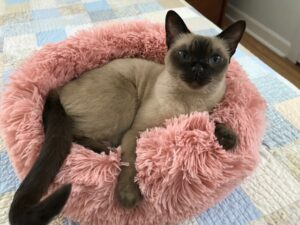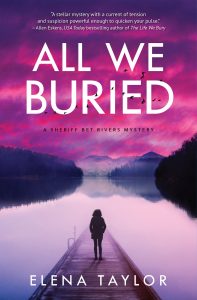Speculative fiction author RLM Cooper launches her debut novel, Legacy 627.
Learn more about speculative fiction, the author, and her gorgeous Tonkinese—Sylvie.
Speculative Fiction: Legacy 627

Cascadia, September 2133
On her 30th birthday, Alex Glover, Cascadian Intelligence Mission Agent, comes into possession of a unique journal that once belonged to a young American woman.
On that day she also becomes the target of an American military determined to possess the journal—and the secret it contains—for themselves.
How the journal came to be in Cascadia is just one of the mysteries Alex and the CIMA-2 team must solve before they find themselves in a race against both time and the determined Americans as they embark upon a mission that takes them from Cascadia to Atlanta and across the American South.
Their mission: rescue one of their own being detained by the American FBI and recover and destroy a deadly substance that has already killed nearly a dozen people—a substance the Americans are eager to obtain and weaponize.
Millions of lives are at risk.
Failure is not an option.
To purchase the book, click on any of the following links: Black Opal Books, Barnes & Noble & Kobo
Interview with Speculative Fiction Author RLM Cooper
Tell us about your road to publication:
I have to laugh at this question because, in truth, I had about given up on ever finding a publisher when a contract finally came.
I had received several rejections, the most memorable of which was a short comment that came back to me within forty-five minutes of submission stating: “I didn’t like the voice.”
That was quite a bummer, I have to admit.
Another rejection came that gave me hope in that the agent said my story was too similar to another the publisher already had. Well, if others are writing similar things, I decided, then I couldn’t be too far wrong in my thinking. At least that’s what I told myself as I sent the manuscript off once again.
It was a long wait, and about the time I had given up and decided I would just stick with short stories where I have had success, I received a glowing response. The editor loved it! Would I like to sign a contract?
And the rest is history. Or, very recent history as the book was only published this past September.
The ratings are still few but they are almost all five-star and the reviews have been great. So the wait was worth it.
“Since the background story reveals the stark contrast between where this country is currently headed and where it could actually go if we cared enough to take it there, I could only call it speculative.”
Legacy 627 is a speculative fiction thriller. Tell us what that means and how you came to write this story?
Because the story takes place at two different times—both in the future—I was hard-pressed to know exactly how to describe it.
It isn’t a mystery. And it isn’t science fiction even though the action rocks back and forth between 2063 and 2133. Since the background story reveals the stark contrast between where this country is currently headed and where it could actually go if we cared enough to take it there, I could only call it speculative.
I came to write it from the tiniest seed of an image that appeared in my head one day of a girl, or woman, running her finger along a wall covered with glass-fronted, locked boxes—much like the old-fashioned postal boxes still in use in many post offices today.
Like a lot of writers (maybe most) I was faced with the question: This is intriguing, but what’s it all about? It wasn’t much, but the story grew from there. I’m devotee of thrillers—especially those of Connelly, Baldacci, and Child, so perhaps I was somewhat influenced in that direction, though my book is nothing like theirs. Nor did I want it to be.
I learned early on about plagiarism (and how wrong and demoralizing it can be) in high school when we were given an assignment to write a short story to be read to the class. I wrote what I thought was a wonderful story, which, to be generous, was in fact quite sappy. Still, I read it to the class and received polite applause.
Next, a girl rose and proceeded to read, word-for-word and as her own, O. Henry’s “Gift of the Magi.” You can imagine how humbling it was to hear this powerful story after my own youthfully clumsy attempt.
I only discovered O. Henry’s story years later and do not know to this day whether the teacher took the girl aside after class for a reprimand, but I have always hoped so.
You went to college in Alabama and now live in Grants Pass, Oregon. How long have you been in the Pacific Northwest? What brought you here?
After burning out at my job (computer people do that, you know), I retired early and we decided we wanted something different. An adventure, sort of.
So, because my husband had served in the Air Force in Tacoma and was familiar with the PNW, in 2004 we decided to give it a try and moved to Port Townsend, WA. From there, we moved to Santa Rosa, CA for several years until an extremely noisy neighbor made living there impossible.
In 2016 we finally found a lovely house here in Oregon where we live currently. I finished writing Legacy 627 here, though it was begun in California.

One of your hobbies is quilting. How long have you been doing that and what do you love about it?

I began quilting when we lived in Washington, but it wasn’t until the “lock-down” due to the Corona virus that I got more serious with it. I think I have made more than a half-dozen quilts since the virus hit us in March 2020.
We tucked our heads in and pretty much went nowhere. Some of the quilts that resulted have been favorites. Others not so much. But isn’t that the way with any creative endeavor?
Wow—These are amazing!
I am also quite interested in chess and have several sets sitting around the house that I hover over in various stages of problem-solving. This interest, I’m sure, comes from my computer science days and penchant for problem-solving.
It’s such an elegant game with endless possibilities. I find it a very stimulating and worthy pursuit. We have dedicated a wonderful spot in the bay window where we have set up to play.
 When I’m not writing, quilting, or solving chess predicaments, I’m filling my time with football. I’m an avid fan of the Alabama Crimson Tide and I like to follow the guys in the pros once they are drafted. I want them all to be successful.
When I’m not writing, quilting, or solving chess predicaments, I’m filling my time with football. I’m an avid fan of the Alabama Crimson Tide and I like to follow the guys in the pros once they are drafted. I want them all to be successful.
I took my pseudonym from one of them and I still follow him.
Many people think football is just a bunch of guys running around and falling down, but it is, to me, much like chess. The difficult thing in football is that, when the ball is snapped, all the “pieces” move at once and a thousand calculations are being made in a matter of seconds.
It’s really an amazing game once you get to know it.
You also write short stories. How does that process differ from writing a novel?
With a short story you must be concise. There is no room to waste the reader’s time, although this is quite true of the novel, as well. However, while the novel might have several sub-plots, rising actions, obstacles, climaxes, etc., in the short story there is generally room for only one of each.
Start as close to the end as you can, build up quickly—but solidly—and bring it to a satisfying conclusion, usually in only a couple of thousand words. It’s a lot harder than it sounds.
There is no room for world-building that cannot be done in very few words or for extraneous characters or actions.
What are you working on now?
At the moment I am about halfway through the first draft of the sequel to Legacy 627. It continues with one of the characters returning to the United States ostensibly for a visit to the place of her birth and to spend some time with her mother whom she has not seen for approximately five years.
However, (surprise!) it turns out to be quite the serious adventure instead.
For some reason the going is slow. I want to blame it on the lethargy of life due to the corona virus, but it is probably just me. I hate writing first drafts. But I love editing once I have it written.
First drafts are always sub-par, at least for me. It’s the editing process that’s my favorite. That’s where the story really begins to shine.
You finally have the skeleton of the thing. You have your plot and your characters. You know how it begins and how it ends and all the little (and big) detours along the way.
All that remains is to flesh it out with all the really good stuff that makes it so enjoyable—in the writing as well as the reading.
Final words of wisdom for aspiring writers:
The best advice I can offer to anyone writing, but not yet published, is to know the English language. Know how to spell. Do not rely on a spell-checker. Know grammar. Know punctuation. I think editors possibly hate more than anything else having to plow through a manuscript full of misspellings, wrongly used words, and improper punctuation.
You will never be perfect at this and your editor, if he or she is good, will still find errors you had no idea remained in your “finished” manuscript. But just because you will never be perfect, doesn’t mean you shouldn’t give it all you’ve got in the first place.
After that, the absolute best advice is: Have Something To Say.
I can’t stress this enough and cannot tell you the number of books and short stories I have read that evoked a “huh?” or “what was the point?” Those stories are quickly forgotten. Even the most straight-forward story should have something of substance to say—something to leave the reader chewing on once the story is finished.
Those are the stories and books that are remembered long after they have been read and placed back on the shelf, perhaps to be read again someday.
Lastly, tell us about your Tonkinese:
 Ha! You are speaking here of “The Boss.” I drove from Washington down to Portland, Oregon to see her when I discovered a litter of Tonkinese kittens were available. This is a people-loving breed with tons of personality.
Ha! You are speaking here of “The Boss.” I drove from Washington down to Portland, Oregon to see her when I discovered a litter of Tonkinese kittens were available. This is a people-loving breed with tons of personality.
When I first saw her, it was love at first sight. Who could resist that precious kitten face? And, over the years, she has become so much a part of us that it will be hard to let go when the time finally comes.
She’s getting old now—she will be sixteen in February—but I try not to think about that time ahead of us.
Her name is Sylvie and she is an absolute character. She never goes outside and will, when the front door is opened, run halfway up the stairs and look back to make sure no one will be taking her outside.
She wails like a banshee all the way to the vet’s. She absolutely hates it when we sneeze and will promptly leave the room—only to return later when she has deemed it “safe.”
She also leaves the room when we yell during a football game. We have decided she doesn’t much care for football—silly girl.
Thank you for visiting with us to introduce your speculative fiction and Sylvie!
Speculative Fiction Author RLM Cooper
 RLM Cooper writes poetry, short stories, and novel-length fiction. She has been published in literary reviews and print anthologies both domestically and internationally.
RLM Cooper writes poetry, short stories, and novel-length fiction. She has been published in literary reviews and print anthologies both domestically and internationally.
A Southern gal who grew up in the sand, palmetto bushes, and pristine beaches of the Florida west coast, she graduated summa cum laude from the University of Alabama, and spent over seventeen years writing application software for a computer graphics company.
A reclusive introvert, she currently lives in the Pacific Northwest and spends her time (when not writing) quilting, cheering on her favorite football team, trying out new vegan recipes, and playing chess.
To learn more about RLM, click on her name, photo, or either of the following links: Facebook & Twitter
 Elena Taylor is the author of All We Buried, available now in print, e-book, and audio book format at all your favorite on-line retailers. And don’t forget many independent bookstores can order books for you and have them shipped to your home or for curbside pickup.
Elena Taylor is the author of All We Buried, available now in print, e-book, and audio book format at all your favorite on-line retailers. And don’t forget many independent bookstores can order books for you and have them shipped to your home or for curbside pickup.
For more information on All We Buried, click on the link here to visit the home page.




